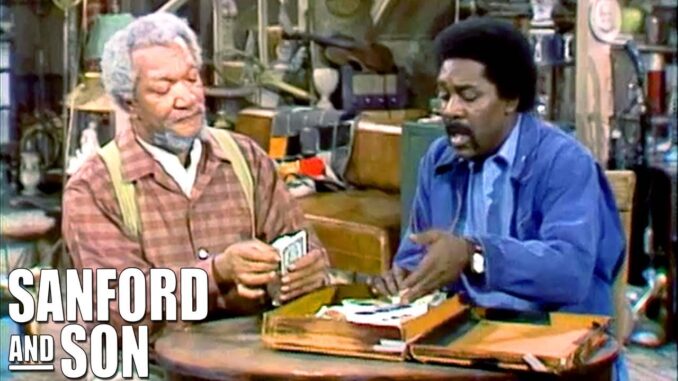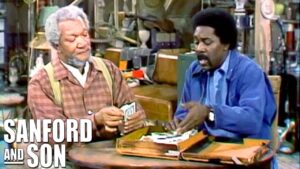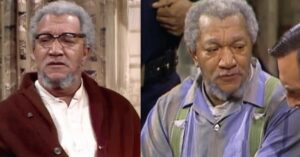
Sanford And Son may have copied other shows, but Redd Foxx was an original (continue)

Like a lot of the sitcoms that Lear and Yorkin worked on in the ’70s, Sanford And Son makes jokes about prejudice that walk up to the line of seeming prejudiced themselves (at least by 2016 standards). But the gay-themed humor in “The Piano Mover” is genuinely funny, for a few reasons. For one, there’s never any confirmation that the wealthy man actually is homosexual, which means that Fred’s presumptions say as much about him as they do about what society winks at. For another, Fred seems more intrigued than disgusted. As Fred, Redd Foxx has a knowing twinkle in his eye, like someone excited to peek into a secret world that he’s only ever heard rumors about. At one point he grabs a long, thin cigarette from a box on the coffee table and lounges back on the couch, fantasizing what it would be like to be invited to a gay party—in every sense of the word “gay.”
That fantasy is the key to what both “The Piano” and “The Piano Movers” are really trying to express. Neither episode writes its themes in bold letters or parcels them out in big speeches. Instead, the message is encoded into the circumstance, the setting, and the performances. Steptoe And Son was often concerned with Harold’s aspirations to rise above his class, and the ways that Albert would keep him in check through some combination of emotional manipulation, public humiliation, and appeals to his son’s pride. In Sanford And Son, Fred similarly schemed and faked his way into holding Lamont down, but less because his son leaving would be a rebuke of everything he stands for (as was the worry in Steptoe) and more because he not-so-secretly liked having someone around to keep him company and do most of his work.
Whatever the subtle differences in the relationships between the Steptoes and the Sanfords, all four men share a dream of not having to scrounge so much to make a living. When each meets the piano owner, they’re impressed by the size and tastefulness of his home, and by the idea that he could be lounging around in a cozy-looking robe in the middle of the day. They want some of what this gentleman has, and so—metaphorically, at least—they try to take it in the form of this massive piece of furniture. Then they can’t even figure out how to fit it through the door.
This is a classic comedic concept, dating back to vaudeville and music hall: the notion of the working-class bumblers who have an awkward encounter with some swell. “The Piano” and “The Piano Movers” may remind comedy connoisseurs of the Laurel and Hardy short The Music Box, which has a similar story, but in reverse. There, the guys face the Herculean task of moving a piano in, by pushing it up a ridiculously long, steep, outdoor stairway. The symbolism works in the same way, though. The piano represents the impossibility of a couple of ordinary blokes ever getting ahead.
This was another way that Sanford And Son distinguished itself from All In The Family. The latter wasn’t about Archie Bunker wishing he were rich; it was about him defending what he had from the ethnic minorities and young folks he presumed were out to take it from him. In Sanford And Son, Fred was just as stubbornly set in his ways as Archie, but his curmudgeonliness was more generalized, aimed at everyone he considered a “dummy.” And while Archie was constantly at odds with his hippie son-in-law, in Sanford Lamont wearily took on the role of liaison between his dad and the rest of the world, if only to make sure that their business stayed afloat.
Harold in Steptoe And Son tries to play a similar part, except that he himself is almost as rough-hewn. There’s no real straight man in the Steptoe duo; they’re each kooky in their own way. That’s why “The Piano Movers” is able to get more comic mileage than “The Piano” out of the running joke of the rich man walking in just when the son is sitting down and the dad’s at work. When it keeps happening to Harold, it’s mildly amusing, but because he’s already something of an oddball it’s to be expected that a wealthy person would distrust him. It’s more hilariously unjust when the well-meaning Lamont keeps getting caught looking like a slack hustler exploiting his aging father.
It also matters that Lamont is black and his employer is white. The class differences in Steptoe are purposefully pronounced, but Sanford has the added wrinkle of race. It’s only directly addressed once in “The Piano Movers,” when Lamont asks if the man reads Ebony and then follows up with, “Why not? I read Life.” But throughout the episode there’s an unspoken expectation of deference that Lamont grudgingly accepts—despite being part of the Black Panther generation—and that Fred thrillingly defies. Albert Steptoe is antisocial because he’s eccentric. But Fred Sanford just doesn’t care what anyone thinks.

That’s another way that “The Piano” and “The Piano Movers” are like theater. For centuries, actors and directors have been reinterpreting the classics: moving Shakespeare to the modern day, say, or gender-swapping Neil Simon’s The Odd Couple. The changes reveal something about both the plays and the times in which they’re staged. The original Steptoe And Son episode is a finely cut little gem, with two terrific central performances from Harry Corbett as Harold and Wilfrid Brambell as Albert, and with a scenario that allows for some wry social commentary. That’s evident just in the way Harold assumes the authoritarian role when Albert arrives, putting his father through the same shoe-removing, antique-protecting rigamarole that he went through the first time he entered the apartment. In Sanford And Son though, Lamont watches as Fred gets put through his shoe-removing paces by the piano-owner. That dynamic has its own meaning: a black man letting some well-to-do white guy tell his dad what to do.
The main connection between “The Piano,” “The Piano Movers,” and theater is that great plays are transformed in every generation by the actors who perform them. Corbett and Brambell were masters, and duly beloved. But Redd Foxx was a comic force like no other. Demond Wilson makes for a sympathetic Lamont, but the big reason why his character is less comedic than Harold is that there was no way Wilson could compete with Foxx’s Fred Sanford. Foxx had impeccable timing, and a semi-dangerous screen presence, both born from years of shocking nightclub audiences with his raunchy stand-up routines.
In later Sanford And Son seasons, the show would move beyond Steptoe And Son and develop its own unique ensemble and attitude. And as often happens with sitcoms over time, the writing and performances would slacken, and rely more on catchphrases and mugging. But “The Piano Movers”—like “The Piano” before it—is so sharp that it could be revived today, with an all-new cast but most of the same lines and plot. Like the best art, it’s open to interpretation.